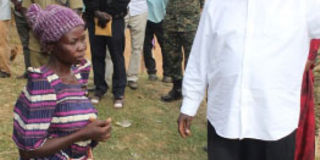Has government got strategy to fight crime?

President Museveni talks to Ms Violet Nabankema, a sister to the late SSP Denis Ssebugwawo, a retired senior police officer, who was among those killed in the New Year’s eve attacks in Bukomansimbi District. PHOTO BY MARTINS E. SSEKWEYAMA.
Barely a week into 2018 and hundreds of Ugandans have either been killed or have lost property in a crime wave spilling over from preceding years that continues to engulf the country.
Law enforcement and other government officials seem clueless and have, in some cases, fired blanks with disjointed proposals, promises and directives to counter the problem. The glaring evidence on ground suggests it is no longer a question of what the problem is but what those in whom power to sort the problem is vested are doing.
Last year, while eulogising slain former police spokesperson Andrew Felix Kaweesi, President Museveni said criminals have infiltrated the police Force and other security agencies, confirming what had until then been a widely pronounced allegation.
But even with the appointing authority venting his frustration and ordering for a “clean up”, little or nothing has been done to purge the same agencies of the said criminals, yet the crime wave, at least from published reports, is only escalating.
Given up?
In the new normal, political leaders, including President Museveni and police boss Gen Kale Kayihura have been reduced to offering condolence messages to victims of the growing violent crime in high profile cases. The political pressures from the faster-growing citizen fears about crime, have been met with mainly pronouncements with no action.
President Museveni once again blamed the New Year day attacks in Bukomansimbi and Lwengo districts on police, which he said were lazy.
The President reiterated the need to install cameras around the country to help identify criminals in the wake of the incident.
The same script was followed as the President, earlier, personally investigated the women killings in Entebbe and Nansana municipalities.
“Police has been using backward methods,” he said, adding: “We are going to solve this using new technology such as DNA to investigate. We shall also install CCTV cameras in major cities to ease police work.”
The stories of killings, robberies, assaults, murders and other such crimes are one too many and it would take more than this entire newspaper to catalogue.
Since the start of 2018, the number of Ugandans who have been killed in unexplained circumstances is hard to quantify, but a search through headlines by major dailies paints a rather grim picture.
“Third boda boda cyclist killed in Soroti”- (Daily Monitor, January 4), “Case Clinic accountant killed, body burnt beyond recognition” - (Daily Monitor, January 4), “Five killed in Bukomansimbi New Year’s eve attacks” - (NTV Uganda, January 1), “How three suspected robbers were gunned down in Namanve (Daily Monitor, January 2).
Countless stories of burglaries and petty crimes such as phone snatching that never make it to national media are mainly told on social media and other private and public engagements, with many people choosing not to report or reporting, in case of stolen phones and other electronics, for purposes of insurance or for SIM card replacement. What will police do?
For Mr Freddie Egesa, a private investigator, it is the will to take action that is pulling the Force back.
“I think there is capacity but we are like a strong four wheel drive car, which has not been ignited but is expected to move. The domestic security system is dormant, there seems to be no one in charge. Crime has become a business and it is the infancy stage of mafiasm. When the system cannot address the crime, criminals start to feel safe,” he says.
To combat crime and the creeping lawlessness, Mr Egesa says those in charge of the country’s internal security apparatus have to return to the basics, stop politicking, and look for guidance but also deal with groups that have infiltrated the country’s security system such as “a Boda Boda force that issues commands”.
Kayihura on the spot
“The Inspector General of Police is on a goose chase. The refusal or failure to issue an annual crime report implies a cover up of the police’s weaknesses. There are weaknesses they don’t want people to know. Police is better facilitated now but when you enter police stations, it turns out you have very hungry officers who are not motivated to work,” Mr Egesa adds.
Police spokesperson Emilian Kayima says those critical of the country’s internal security need to look at the efforts made before reaching any conclusions.
“To say that police is clueless is not only to be cruel, but also to be unfair to the institution of the police and to government in general. We strive as much as we can to deliver on our constitutional mandate of protecting life and property, keeping law and order and fighting crime,” he says. He adds that they have made headway in the Wakiso killings by putting to a halt the killings in Nansana Municipality and Katabi Town Council, arresting suspects and charging them before competent courts of law.
“In greater Masaka, what befell the people of Bukomansimbi and Lwengo on New Year is as well being handled. There are facts and figures on how many are being investigated and how many are in court,” he said.
So, what steps are being taken to avert yet to be committed crimes and to bring perpetrators of those already committed to justice?
“We are enhancing our investigation capabilities. The police recently [December 2, 2017] launched the construction of a state-of-the art forensic facility at Naguru. We have also intensified our community policing programmes across the country,” Mr Kayima says.




